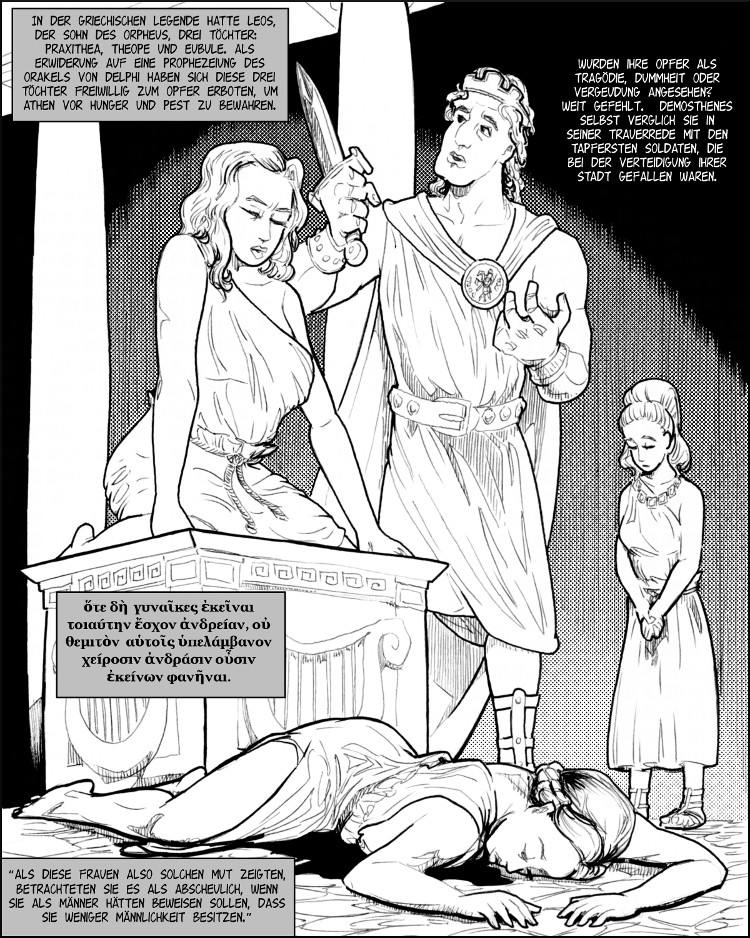

This work is licensed under a Creative Commons Attribution-NonCommercial-ShareAlike 4.0 International License.
PAGE 83 (Single panel page)
Single panel: A representation of Leos sacrificing his three daughters Praxithea, Theope, and Eubule. There are a number of art-historical views of what human sacrifices might have looked like in Archaic Greece and mostly this will be left to the discretion of the artist, with the recommendation that he image search some of the more famous Greek maiden sacrifices, such as those of Iphigenia or Polyxena, and extrapolate from there. Perhaps Praxithea can be lying already sacrificed at her father’s feet, Theope can be under the knife, and Eubule can be patiently waiting her turn. The four captions can be at the corners of the illustration, or otherwise arranged as seems reasonable.
CAPTION – UU Minister speaking (1): In Greek legend, Leos, the son of Orpheus, had three daughters: Praxithea, Theope, and Eubule. In response to a prophecy from the Oracle at Delphi, these three daughters volunteered themselves for sacrifice to save Athens from famine and plague.
Translation (1): In der griechischen Legende hatte Leos, der Sohn des Orpheus, drei Töchter: Praxithea, Theope und Eubule. Als Erwiderung auf eine Prophezeiung des Orakels von Delphi haben sich diese drei Töchter freiwillig zum Opfer erboten, um Athen vor Hunger und Pest zu bewahren.
CAPTION – UU Minister speaking (2): Were their sacrifices regarded as tragedy, stupidity, or waste? Far from it. Demosthenes himself, in his funeral oration, compared them to the bravest of soldiers who fell defending their city.
Translation (2): Wurden ihre Opfer als Tragödie, Dummheit oder Vergeudung angesehen? Weit gefehlt. Demosthenes selbst verglich sie in seiner Trauerrede mit den tapfersten Soldaten, die bei der Verteidigung ihrer Stadt gefallen waren.
CAPTION – UU Minister quoting Demosthenes (3): ὅτε δὴ γυναῖκες ἐκεῖναι τοιαύτην ἔσχον ἀνδρείαν, οὐ θεμιτὸν αὑτοῖς ὑπελάμβανον χείροσιν ἀνδράσιν οὖσιν ἐκείνων φανῆναι.
Comment (3): Do not attempt to translate this passage in Greek. It’s translated into English at (4) below, and you can translate it from there into your target language.
CAPTION – UU – Minister translating (4): “When, therefore, such courage was displayed by those women, they looked upon it as a heinous thing if they, being men, should have proved to possess less of manhood.”
Translation (4): “Als diese Frauen also solchen Mut zeigten, betrachteten sie es als abscheulich, wenn sie als Männer hätten beweisen sollen, dass sie weniger Männlichkeit besitzen.”
![]() Köder (Deutsch/Langseitige Version)
Köder (Deutsch/Langseitige Version)
Köder (Deutsch/Dia-Version)
